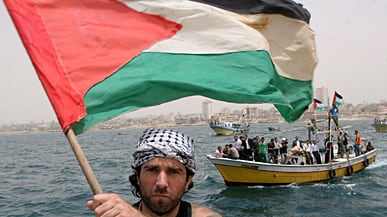It could not have been easy for Vittorio Arrigoni to blend in around Gaza. Tall and tattooed, with a ring threading his bushy eyebrow, the pro-Palestinian activist from Italy lived in Gaza for more than two years, at a time when other foreign nationals mostly stayed away. His routine included boating with Gazan fishermen who are frequently chased by Israeli patrol boats, visiting with Palestinians injured in Israeli shelling, and lifting weights at Gaza’s one indoor gym.

At around 10 p.m. last Wednesday, after an hour-long workout, Arrigoni ordered takeout food at a beach-front restaurant but never picked it up. “That’s about the time his cell phone went dead,” says Joe Catrone, a fellow activist with the pro-Palestinian International Solidarity Movement. Somewhere between the gym and the restaurant, Palestinian militants grabbed Arrigoni and took him to an apartment in Gaza City’s Karameh neighborhood, where they filmed him looking bruised and frightened, then strangled him with a plastic cord.
The murder appears to have been the work of a fringe Islamic group known as Tawhid and Jihad -- even more extremist than the Islamists of Hamas who control Gaza. It raises troubling questions about the increasing radicalism in the Strip, which Israel has largely sequestered since Hamas grabbed power there in 2007. It also poses a dilemma for the few Westerners who still live in Gaza, mostly humanitarian workers and a few political activists. Like Arrigoni, they are easy targets for groups trying to wring concessions from the government or settle scores. In the video they shot of Arrigoni and posted on YouTube, the militants gave Hamas a 30-hour deadline to release a number of their jailed comrades. Investigators say the abductors killed their captive long before the deadline passed.
Arrigoni, who was 36, had started making regular trips to Gaza and the West Bank in 2002. In his Italian blog, he documented what he described as Israeli oppression against Palestinians. One video posted on the blog shows Arrigoni walking along a Gaza beach and talking about his decision to champion Palestinian rights. Among other things, he says it was his grandparents’ fight against fascism during World War Two that inspired his own activism. His current stint in Gaza began in 2008, when he arrived with other activists by ship on a blockade-busting voyage. Until this past week, he had lived with four other members of the International Solidarity Movement in Gaza.
The extremist groups pose a real problem for Hamas – and by extension for the international community.
Catrone, one of the four, says the ISM had largely ceased operating in Gaza after one of its members, Rachel Corrie, died trying to stop an Israeli bulldozer from demolishing Palestinian homes in 2003. Arrigoni had helped reconstitute the group’s activities there. Catrone himself arrived in Gaza just last month from his home in New York City. He says he responded to an email the group sent its members asking for volunteers who would challenge the land blockade Egypt has imposed on Gaza. “With President Hosni Mubarak gone, we wanted to see if the policy at the border would change,” he says. Catrone and nine other activists flew to Egypt and then drove in two cars across the border into Gaza with a bag of cement, which Palestinians had previously been barred from importing. (Israel says Palestinian engineers use the cement in their rocket-making.) “We go through without a problem.”
Catrone says the murder was an isolated incident perpetrated by a few “marginal fanatical individuals, which every society has including ours.” But a report issued just weeks ago by the International Crisis Group suggests the extremist groups pose a real problem for Hamas – and by extension for the international community. The report says the groups draw their support from low-ranking members of Hamas’ military wing who are disappointed that Hamas has not imposed Islamic law in Gaza. The groups are responsible for much of the rocket-fire directed at Israel, according to the ICG, and could be behind a string of attacks on shops and restaurants in Gaza that “appear un-Islamic.” To the international community, the report says, the violence should serve as a reminder that “the alternative to Hamas in Gaza is not only or necessarily Fatah [the party of Palestinian President Mahmoud Abbas]. It also is the more radical Islamist groups.”
Arrigoni had planned to leave Gaza this month. Mohammed Elzaeem, who worked as his translator and became a close friend, said Arrigoni wanted to be at the bedside of his father, now sick with cancer. He first planned to travel two weeks ago but postponed the trip when violence flared in Gaza. “The last time I saw him, he said he’s planning to leave this Sunday.” Elzaeem said Arrigoni was not sure what he would do back in Italy. He said Arrigoni had a degree in accounting but worked in the profession for just a few months, then worked as a truck driver before devoting himself to the Palestinian cause. Elzaeem said he’ll remember joking with Arrigoni, talking politics and getting drunk when alcohol was available. “I feel terrible that Palestinians did this to him.”
Dan Ephron has been Newsweek’s Jerusalem bureau chief since January, 2010. Previously, he served as a national security correspondent and deputy bureau chief for the magazine in Washington. His stories have also appeared in the Boston Globe, The New Republic and Esquire.





